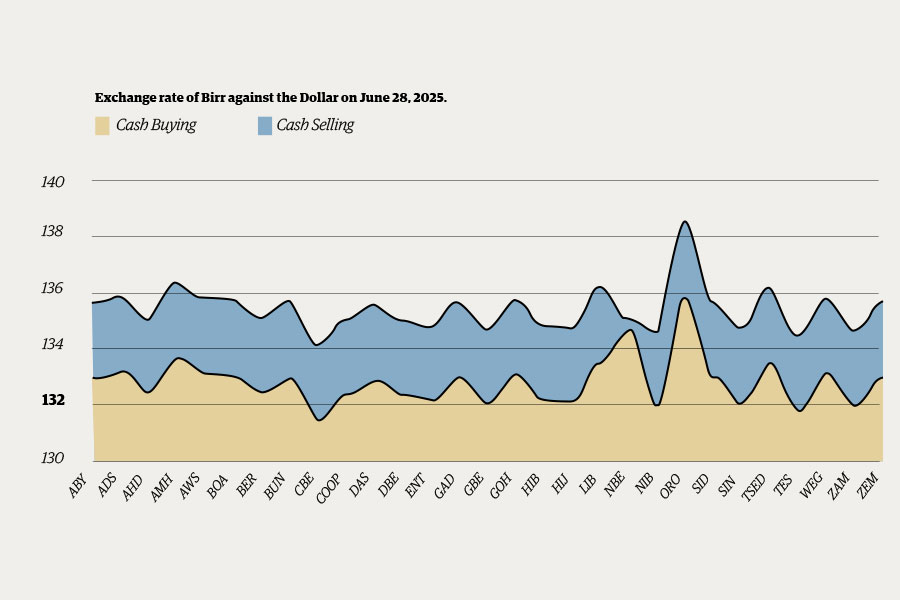
My Opinion | Feb 26,2022
Jun 8 , 2019
By Tsion Fisseha
In a show that talked about the different attires that attract both the female and male genders to one another, random people on the street gave various responses. Among the respondents, one caught my attention immediately. These responses would later be a point of discussion with my friends.
The first respondent said, “I like girls that wear short dresses. You know the types that are not afraid of showing off their assets.” The respondent continued, “I like girls that do not make a big deal out of a whole lot.”
The other one confidently said, “If I look at my wife, and I do not like what she is wearing, then there is no way I would let her leave the house like that. I would definitely make her change what she is wearing.”
This particular response, for me and for most of my friends who identify as feminists, did not just stop at clothing. It dragged us into the thought process of the power dynamics of that household.
Ethiopia is a land of a long cultural, political and economic history. It has dealt with famine, war (both internal and external) and many challenges, and it still is.
One of the battles that is being fought at this moment in time, with the help of the enlightened in society, is the narrative of gender equality.
This battle depicts the challenges that the female gender is currently facing in the country that we are living in.
The front runner among the challenges is sexual and gender-based violence that has killed and is killing so many innocent young girls and women.
In a recent statement released by the Addis Abeba Police Commission, in the past nine months, 13 women have been killed due to sexual and gender-based violence.
In addition to the killings and the physical abuse, these women are also vulnerable to psychological abuse that can last a lifetime.“An abuser doesn’t just beat and kick her but also makes her believe that there is no one else for her and that he is the only one she could count on,” says Zehra Legesse, psychologist and social worker, while talking about violence against women.
All of these, the statistics, the psychological impact and the misogyny flashed before me when the respondent said, “I would definitely make her change what she is wearing.”
There is always the possibility that the statement was spoken in the utterly positive sense. It is a possibility that the respondent did not mean it in a condescending manner. But negative light has been shed by both me and my friends that highlights the very fact that the comment set forth by the respondent could be an affirmation of patriarchy.
The respondents’ comment could easily be directed back to him to say “NO!”, not only about clothing but to any of the decisions made by the wife.
“Much work in feminist theory is devoted to the tasks of critiquing women’s subordination, analysing the intersections between sexism and other forms of subordination,” writes Amy Allen in her paper Feminist Perspectives on Power.
The institutional and legal structures of many countries were set up in such a way as to perpetuate patriarchy. Whether this is a cultural or evolutionary bias, the fact remains that those who want to stand for women’s rights find themselves at a crossroads.
However, laws are meant to change for the betterment of society, not just women. Things need to change from the grassroots level, allowing women and men to find a fine line around the power dynamics. This could be as big as enacting new legislation and reforming judicial systems to the smallest task of being able to wear what one wants without the intervention of others.
The Australian activist and writer G.D. Anderson once wrote, “Feminism isn’t about making women strong. Women are already strong. It’s about changing the way the world perceives that strength.”
PUBLISHED ON
Jun 08,2019 [ VOL
20 , NO
997]


My Opinion | Feb 26,2022

Viewpoints | May 06,2023

Money Market Watch | Jun 29,2025

Fortune News | Oct 27,2024

My Opinion | Apr 04,2020

Commentaries | Jan 27,2024

Viewpoints | Feb 04,2023

My Opinion | May 08,2021

Viewpoints | Aug 29,2020

Commentaries | Feb 22,2020

Photo Gallery | 174585 Views | May 06,2019

Photo Gallery | 164813 Views | Apr 26,2019

Photo Gallery | 155007 Views | Oct 06,2021

My Opinion | 136695 Views | Aug 14,2021
Editorial | Oct 11,2025

Dec 22 , 2024 . By TIZITA SHEWAFERAW
Charged with transforming colossal state-owned enterprises into modern and competitiv...

Aug 18 , 2024 . By AKSAH ITALO
Although predictable Yonas Zerihun's job in the ride-hailing service is not immune to...

Jul 28 , 2024 . By TIZITA SHEWAFERAW
Unhabitual, perhaps too many, Samuel Gebreyohannes, 38, used to occasionally enjoy a couple of beers at breakfast. However, he recently swit...

Jul 13 , 2024 . By AKSAH ITALO
Investors who rely on tractors, trucks, and field vehicles for commuting, transporting commodities, and f...

Oct 11 , 2025
Ladislas Farago, a roving Associated Press (AP) correspondent, arrived in Ethiopia in...

Oct 4 , 2025
Eyob Tekalegn (PhD) had been in the Governor's chair for only weeks when, on Septembe...

Sep 27 , 2025
Four years into an experiment with “shock therapy” in education, the national moo...

Sep 20 , 2025
Getachew Reda's return to the national stage was always going to stir attention. Once...

Oct 12 , 2025
Tomato prices in Addis Abeba have surged to unprecedented levels, with retail stands charging between 85 Br and 140 Br a kilo, nearly triple...

Oct 12 , 2025 . By BEZAWIT HULUAGER
A sweeping change in the vehicle licensing system has tilted the scales in favour of electric vehicle (EV...

A simmering dispute between the legal profession and the federal government is nearing a breaking point,...

Oct 12 , 2025 . By NAHOM AYELE
A violent storm that ripped through the flower belt of Bishoftu (Debreziet), 45Km east of the capital, in...